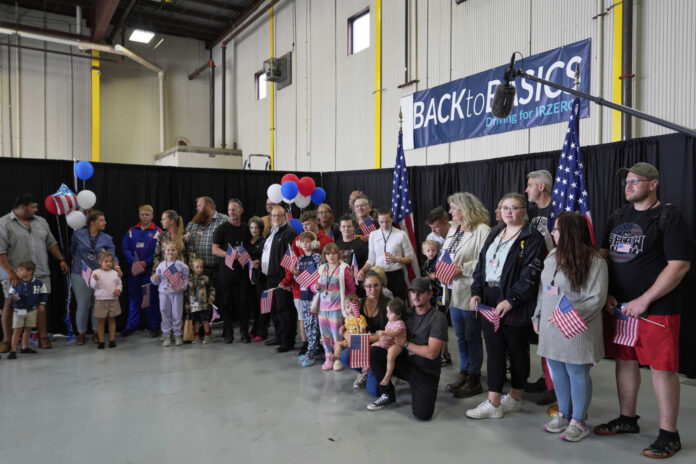DULLES (Virginia) (AP).- The Trump administration welcomed a small number of white South Africans on Monday as refugees. They said they faced discrimination and violence in their home country, something the government denies.
Refugee advocates have also questioned the decision to admit 49 people, asking why they should be admitted at a time when the Trump Administration has suspended its efforts to resettle refugees who have fled wars and persecutions and gone through years-long vetting procedures before arriving in the United States.
The group, which included children waving small American flags and a private charter aircraft, arrived on Dulles International Airport near Washington, D.C., and was welcomed by Homeland Security Deputy Sec. Troy Edgar and Deputy Secretary Christopher Landau.
Landau, who was speaking to the group of Americans in an airport hangar with many holding American flags, said: “I want to let you know that you’re really welcome here. We respect what you had to go through these past few years.” “We respect your long history and the achievements of your people over the years.”
Donald Trump said to reporters on Monday that the “genocide” that is taking place in South Africa post-apartheid has led him to admit them as refugees. He plans to discuss the issue next week with the South African leadership.
The South African government strongly denies this characterization, and experts and an Afrikaner group have also disputed it.
The South African government has said that U.S. accusations of persecuting white Afrikaners, a minority group in the country, are “completely untrue” and are the result of misinformation. The government cited that Afrikaners were among the most prosperous and successful people in South Africa and called them “the most financially privileged.”
At a business conference held in Ivory Coast on Monday, South African president Cyril Ramaphosa revealed that he had spoken with Trump recently by phone and informed him that groups were feeding false information to his administration, portraying whites as the victims of historical wrongs such as colonialism, and South Africa’s former apartheid regime of forced racial separation, which oppressed South Africa’s Black majority.
Ramaphosa stated, “I spoke with President Trump over the phone. He asked me what was going on in South Africa. I replied that it is not true what people are telling you.
Ramaphosa stated that he believed Trump “understood” this.
The Afrikaners are South Africa’s biggest white group. They were also the leaders of apartheid, the brutal government that enforced racial separation for almost 50 years until it was ended in 1994. South Africa’s many races have been reconciled to a large extent since apartheid was ended. However, there are still tensions between certain Afrikaner and Black groups.
Trump began promoting the claim that white farmers are being killed in South Africa on a massive scale due to their race even as early as 2018, during his first term.
Elon Musk, a Trump ally born in South Africa who has been active on social media for some time now, posted that certain politicians are “actively promoting the white genocide” in South Africa.
South Africa has a high level of violent crime. White farmers have been murdered in rural Afrikaner villages. This has been a persistent problem for many decades. The government condemns these killings, but claims they are part and parcel of the crime problem in the country.
Ronald Lamola, South African Minister of Foreign Affairs, said on Monday that “there is no evidence whatsoever that white South Africans are being persecuted or that white Afrikaners who are farmers in particular have been targeted.” “White farmers are affected by crimes just as any other South Africans.” This is not a factual statement, and it lacks any basis.
On his first day as president, Trump suspended indefinitely the refugee resettlement programme — which had historically enjoyed widespread bipartisan support. He announced his plan to resettle the white South African farmers with their families as refugees a month later.
The U.S. Embassy for South Africa states that applicants must be South Africans who are either of the Afrikaner ethnicity, or members of a South African racial minority, and have a history or fear of persecution.
Afrikaners are descendants of colonial settlers, mainly Dutch and French, who arrived in South Africa during the 17th century. Around 2.7 million people in South Africa, which has a population of more than 80% Black, are Afrikaners.
After Trump’s executive order, groups have sued the U.S. government to reinstate its refugee program.
To qualify as a Refugee, an applicant must show a fear of persecution based on certain factors: race, religion or nationality; membership in a social group; political opinions. Asylum seekers are not refugees because they must be living outside the United States to qualify.
Refugees are given 90 days federal aid for rent and other expenses once they arrive in the U.S. The Episcopal Church migration service is refusing to comply with a federal directive to resettle South Africans who have been granted refugee status. They cite the church’s “longstanding commitment to racial reconciliation and justice.”
NEWSLETTER SIGNUP
Subscribe to our newsletter! Get updates on all the latest news in Virginia.



